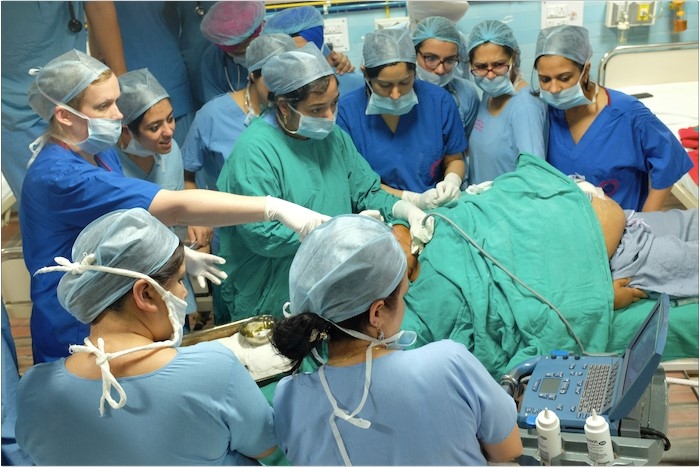Faculty member Dr. Angela Selzer, and CA-3s Dr. Eric Chavoustie and Dr. Zack Turnbull are continuing their time in Amritsar, Punjab, India as part of our Residency Program's Global Health Elective. Living up to the NewYork-Presbyterian tagline, they report that amazing things are indeed happening. As our elective participants learn in one of our educational modules, ultrasound use in this part of India has been difficult heretofore because of in utero sex determination and female feticide.In helping expand the technique of utilizing ultrasound in adminsitering regional blocks, Drs. Selzer, Chavoustie, and Turnbull are breaking down those barriers.
The staff at Sri Guru Ram Das Institute are welcoming ultrasound technology into their practice at an extraordinary pace. Dr. Selzer provided the details of these developments, as well as the work our elective participants have been doing over the last several days:
March 19th, 2015
The use of ultrasound guided regional blocks has really taken off here...
Ultrasound machines are tightly restricted in this country secondary to its abuse in facilitating gender-selective abortions. Fortunately, however, the resourceful and brilliant chairwoman of the anesthesiology department, Dr Ruchi, was able to obtain a Sonosite Ultrasound machine from the radiology department during our visit. Every morning this week, Angie gave a lecture on ultrasound guided blocks. Then, in the OTs (‘operating theaters’), we all helped teach faculty and residents perform blocks.
- So far, We have done:
- 1 supraclavicular
- 1 infraclavicular
- 5 TAP blocks (2 bilateral and 1 subcostal)
- 1 lateral femoral cutaneous block
- 2 popliteal blocks
- 1 saphenous block
- 1 femoral block
- 1 central line placement
Here are some photos...
(LEFT) A third year (CA-3 equivalent) resident practices needling techniques on a phantom we brought following the introductory lecture on ultrasound basics. (RIGHT) Residents and faculty practice scanning and nerve identification on a volunteer.
(LEFT) Demonstrating ultrasound anatomy for a supraclavicular block. (RIGHT) Eric performs our first block in India…An infraclavicular block for a Dupuytren’s contracture.
(LEFT) Zack gowns up for a spinal. (CENTER) This work can be exhausting…we frequently re-energize with a hot cup of Chai tea. (RIGHT) The first ultrasound guided block performed by a SGRD faculty member was a supraclavicular block for a forearm “two bone” fracture. After successfully performing this block, she was able to perform one independently for a forearm fracture which came in during her overnight call.
The first ever central line placement under ultrasound guidance at Sri Guru Ram Das hospital. Residents and faculty crowd around to see the ultrasound guided placement. Once we confirmed correct wire placement with the ultrasound, we received a round of applause!
We did one last block before we called it a day…
A woman with a colon resection under exlap who had severe postoperative pain (she could not afford an epidural—the standard of care at this hospital for this surgery). We were able to give her some additional relief with bilateral TAP blocks. A faculty member blocked one side and allowed Eric to block the other (so he can get one more TAP block before graduation!). All in all…I’ve been so impressed at how quickly they’ve learned and adopted the use of ultrasound guidance for regional anesthesia.
It has been a great pleasure for me to teach such enthusiastic and engaged anesthesiologists a new skill.
—Angie Selzer, M.D.
I look forward to continuing to post updates as the participants in our Global Health elective continue their work.






